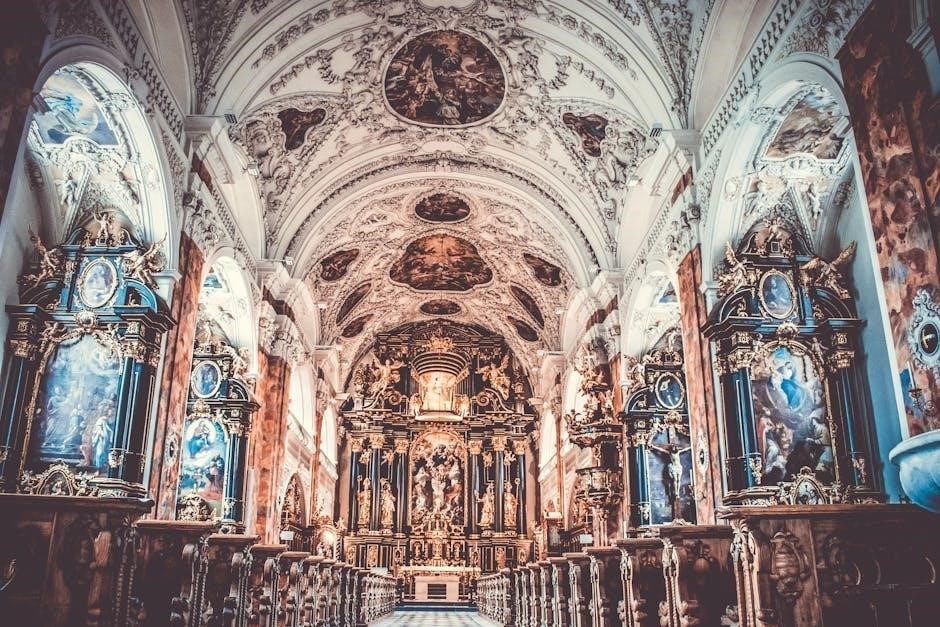
The Profession of Faith is a solemn declaration of belief, rooted in the Nicene and Apostles’ Creeds, expressing the Church’s core teachings on the Holy Trinity, Jesus’ divinity, and the unity of God.
1.1 Definition and Significance
The Profession of Faith, a cornerstone of Catholic belief, is a formal declaration of acceptance of the Church’s teachings. It encapsulates the essence of Catholic doctrine, emphasizing the Holy Trinity, the divinity of Jesus Christ, and the unity of God. This act of faith is both a personal commitment and a communal affirmation, reinforcing the believer’s adherence to the Church’s teachings. Historically, it has been a pivotal element in defining Catholic identity, particularly during ecumenical councils like Nicaea and Trent, where creeds were established to combat heresy. By professing faith publicly, individuals reaffirm their loyalty to the Church and its traditions, fostering unity among the global Catholic community. This declaration is not merely a ritual but a profound expression of spiritual devotion and theological conviction.
1.2 Historical Context
The Profession of Faith traces its roots to early Christianity, particularly the Council of Nicaea in 325 AD, where the Nicene Creed was formulated to counter Arianism. This creed became a cornerstone of Catholic doctrine, affirming the divinity of Jesus Christ and the Holy Trinity. Later, the Council of Trent in the 16th century reaffirmed these teachings, emphasizing the Profession of Faith as a response to Protestant Reformation challenges. Over centuries, this declaration has evolved, but its core purpose remains unchanged: to unite believers in a shared understanding of Catholic teachings. Today, it continues to be a vital expression of faith, reflecting the Church’s enduring commitment to its foundational beliefs. This historical context underscores its significance as both a personal and communal act of devotion;
1.3 Purpose of the Profession of Faith
The Profession of Faith serves as a profound declaration of one’s commitment to the Catholic Church’s teachings. Its primary purpose is to publicly affirm belief in the core doctrines of Christianity, including the Holy Trinity, the divinity of Jesus Christ, and the authority of the Church. This act strengthens personal faith and fosters unity among believers, ensuring continuity in the transmission of Catholic traditions. It also provides a spiritual foundation for individuals, guiding their moral and ethical conduct. By professing faith, individuals reaffirm their acceptance of God’s revelation and their loyalty to the Church’s Magisterium. This practice is essential for deepening spiritual life and maintaining the integrity of Catholic identity across generations. Through this declaration, the faithful visibly demonstrate their dedication to living according to the Church’s teachings.
The core elements include the Nicene Creed, Apostles’ Creed, and the Holy Trinity, emphasizing belief in one God, the divinity of Jesus Christ, and the Holy Spirit’s role in the Church. The Nicene Creed is a foundational statement of Catholic faith, established at the Council of Nicaea in 325 AD, affirming the divinity of Jesus Christ and the Holy Trinity. It declares belief in one God, the Father Almighty, and in Jesus Christ, the only begotten Son, born of the Father before all ages. The Creed also professes faith in the Holy Spirit, who proceeds from the Father and the Son, and is worshiped and glorified with them. It underscores the resurrection of the dead, the forgiveness of sins, and the eternal life promised through the communion of saints. This creed is recited during Mass and serves as a unifying declaration of Catholic doctrine, reflecting the Church’s understanding of God’s nature and salvific plan. Its recitation strengthens believers’ commitment to the core teachings of Christianity. The Apostles’ Creed is a concise and ancient statement of Christian faith, traditionally attributed to the Apostles themselves. It serves as a foundational profession of belief, often recited during Baptism and the Rosary. The Creed affirms belief in one God, the Father Almighty, and in Jesus Christ, His only Son, who was conceived by the Holy Spirit and born of the Virgin Mary. It also professes faith in the Holy Spirit, the holy Catholic Church, the communion of saints, the forgiveness of sins, the resurrection of the body, and life everlasting. This creed is deeply rooted in Scripture and is considered a summary of the basic tenets of Christian doctrine. Its simplicity makes it accessible to all believers, while its depth reflects the mysteries of the faith. It is a powerful expression of unity among Catholics worldwide. The Holy Trinity is the central mystery of the Catholic faith, describing God as one divine essence in three distinct Persons: the Father, the Son, and the Holy Spirit. The Father is the creator of all, the Son is the redeemer, and the Holy Spirit is the sanctifier. This doctrine underscores the unity and uniqueness of God while revealing the distinct roles of each Person. The Trinity is a profound mystery, beyond human comprehension, yet revealed through Scripture and Tradition. In the Profession of Faith, Catholics affirm belief in the Father, the divinity of Jesus Christ, and the Holy Spirit, recognizing their eternal communion and shared divine nature. This belief is foundational to Catholic theology and worship, emphasizing the relational nature of God. The Trinity inspires devotion and shapes the Church’s understanding of love, community, and salvation. The ritual involves a formal declaration, often led by a minister, with congregational participation, emphasizing communal belief and spiritual commitment within the Church. The minister plays a central role in the Profession of Faith, guiding the congregation and ensuring the ritual’s integrity. They lead prayers, recite creeds, and invite the faithful to profess their beliefs, fostering unity and devotion. The minister’s authority, derived from their ordination, adds solemnity to the declaration. They also provide catechetical instruction, preparing individuals to understand and embrace the faith deeply. By facilitating this sacred act, the minister strengthens the community’s bond with the Church and its teachings. Their presence ensures the ceremony aligns with tradition, making the Profession of Faith a meaningful and transformative experience for all participants. The congregation plays a vital role in the Profession of Faith, actively engaging in the ritual through collective prayer and recitation of creeds. Their participation underscores the communal nature of faith, fostering unity and shared commitment to the Church’s teachings. The congregation’s involvement is not passive; it is a public affirmation of their beliefs, strengthening their spiritual bond with the Church. By joining in the Profession of Faith, they reaffirm their baptismal vows and express solidarity with the global Catholic community. This collective act of worship deepens their understanding of the faith and inspires them to live according to its principles. The congregation’s active involvement is essential, as it transforms the ceremony into a powerful expression of shared devotion and commitment. The procession and invocation are integral parts of the Profession of Faith, setting a sacred tone for the ceremony. The procession, often accompanied by hymns, symbols, and liturgical objects, signifies the community’s journey toward God. It unites the faithful, creating a visual and spiritual representation of their collective devotion. The invocation, typically led by the minister, calls upon the Holy Spirit to guide the assembly, seeking divine grace and enlightenment. This invocation is a humble acknowledgment of God’s presence and a plea for spiritual renewal. Together, the procession and invocation prepare the hearts of the participants, drawing them into a deeper encounter with the divine and fostering an atmosphere of reverence and prayer. These rituals emphasize the communal and sacred nature of professing faith. The clergy and laity collaborate in professing and living the Catholic faith. Clergy guide through teachings and sacraments, while the laity embody faith in daily life and witness. Catholic teachers play a pivotal role in imparting the faith, ensuring its transmission to future generations. They are entrusted with the sacred duty of educating students in the teachings of the Church, emphasizing the core beliefs outlined in the Nicene and Apostles’ Creeds. These educators are expected to model a life of faith and integrity, creating an environment where students can grow in their understanding and love for God. Additionally, they are responsible for addressing any challenges or questions that arise, guiding their students with wisdom and compassion; By fostering a deep appreciation for the Catholic faith, teachers help students develop a strong moral and spiritual foundation. Their role extends beyond academics, shaping the spiritual lives of their pupils. The pastor serves as a spiritual leader and guide, entrusted with fostering the faith of the congregation. They are responsible for ensuring the accurate transmission of Catholic teachings, including the Profession of Faith, and for helping the faithful deepen their understanding of the Church’s doctrine. Pastors also play a key role in celebrating the sacraments, particularly Baptism and the Eucharist, which are central to the Profession of Faith. They are called to provide spiritual guidance, resolve doubts, and strengthen the community’s commitment to the faith. Additionally, pastors collaborate with Catholic teachers, supporting them in their mission to educate and inspire. By their example and leadership, pastors help the faithful live out their Profession of Faith in daily life, fostering a vibrant and united Catholic community. Their role is essential in nurturing the spiritual growth of the flock entrusted to their care. The laity, as baptized members of the Church, are called to live out their Profession of Faith actively in the world. Their commitment involves witnessing to the Gospel in their daily lives, fostering a deep spiritual life, and participating in the sacraments. Lay Catholics are encouraged to engage in prayer, devotion, and acts of charity, embodying the teachings of the Church. They also play a vital role in the Church’s mission by sharing their faith with others and contributing to the community’s spiritual growth. The laity’s commitment is not limited to personal piety but extends to transforming society according to Christian values. By living their faith authentically, they fulfill their baptismal calling and support the clergy in building a vibrant and faith-filled Catholic community. Their dedication is essential for the Church’s mission and the unity of all believers. The Profession of Faith is rooted in the Nicene Creed, emphasizing the Holy Trinity, God’s nature, and Christ’s divinity. It affirms the Holy Spirit’s role in the Church, the forgiveness of sins, and the resurrection of the body, ensuring a steadfast theological framework for Catholic belief. The Profession of Faith underscores the Catholic doctrine that God is one in nature yet three in Persons—Father, Son, and Holy Spirit. Jesus Christ, as the Only Begotten Son, is affirmed as true God from true God, sharing the same divine essence as the Father. This belief is central to the Creed, emphasizing Christ’s divinity and His role as Savior; The Church teaches that Jesus’ divine nature is inseparable from His human nature, making Him the perfect mediator between God and humanity; This theological foundation is vital for understanding the mysteries of the Trinity and the redemption brought through Christ’s life, death, and resurrection. The Holy Spirit, as the Lord and giver of life, proceeds from the Father and the Son, being adored and glorified alongside them. The Profession of Faith highlights the Spirit’s role in animating the Church, guiding its teachings, and fostering unity among believers. Through the Holy Spirit, the Church is empowered to fulfill its mission, and believers are sanctified and strengthened in their faith. The Spirit is central to the sacraments, particularly baptism and confirmation, where it imparts divine life and gifts for Christian living. The Church’s vitality and missionary spirit are sustained by the Holy Spirit, who continually renews and guides the faithful in their journey toward holiness and eternal life. This divine presence ensures the Church remains a living, dynamic community of faith and love. The Profession of Faith emphasizes the belief in the communion of saints and the forgiveness of sins, central to Catholic doctrine. The communion of saints signifies the unity and solidarity of all the faithful, both the living and the dead, in the Body of Christ. This unity is rooted in the shared life of grace and the bond of charity. The forgiveness of sins, achieved through Jesus’ redemptive sacrifice, is expressed in the sacraments, particularly baptism and reconciliation. The Church teaches that sin is remitted through divine mercy, restoring the believer’s relationship with God and the community. This doctrine underscores the hope of eternal life and the resurrection of the body, as professed in the Nicene Creed, reinforcing the Church’s mission to spread God’s forgiveness and promote unity among all believers. The Profession of Faith evolved through councils like Nicaea and Trent, solidifying Catholic doctrine and addressing theological challenges, ensuring a clear, unified expression of Christian beliefs. The Council of Nicaea, convened in 325 AD by Emperor Constantine, marked a pivotal moment in Christian history. It addressed the Arian controversy, which questioned the divinity of Jesus Christ. The Nicene Creed, formulated during this council, affirmed Jesus as “true God from true God” and “of one substance with the Father.” This declaration solidified the doctrine of the Holy Trinity and established a unified profession of faith across the Church. The Creed’s phrasing was carefully crafted to refute heresy and provide a clear, concise expression of Catholic belief. Its adoption ensured theological clarity and set a precedent for future councils to address doctrinal issues. The Nicene Creed remains a cornerstone of Catholic faith, recited during Mass and serving as a foundational Profession of Faith. The Council of Trent, convened from 1545 to 1563, was a response to the Protestant Reformation, aiming to clarify and reaffirm Catholic doctrine. It emphasized the importance of the Profession of Faith as a means to counter heresy and unify the Church. The council reaffirmed the Nicene and Apostles’ Creeds, while also addressing sacramental theology and the role of tradition. Trent’s decrees mandated the use of the Tridentine Creed, a detailed Profession of Faith that encapsulated Catholic teachings on the Trinity, the Incarnation, and the Church’s authority. This profession became a cornerstone for Catholic identity, ensuring fidelity to doctrine and providing a clear framework for catechesis. The Council of Trent’s emphasis on the Profession of Faith solidified its role as a vital expression of Catholic belief and practice, enduring to this day. The Profession of Faith remains a cornerstone of Catholic identity, adapting to contemporary contexts while maintaining its timeless truths. Modern interpretations emphasize its role in fostering unity among believers and addressing spiritual challenges in a secular world. The Nicene and Apostles’ Creeds continue to guide believers, while the Church encourages active participation in rituals like processions and public professions. Clergy and laity alike are called to witness their faith, blending tradition with modern expressions of devotion. The Profession of Faith also plays a crucial role in ecumenical dialogue, highlighting shared beliefs across Christian traditions. By living out their faith, Catholics embody the teachings of the Church, demonstrating their commitment to the Holy Trinity, the forgiveness of sins, and the hope of eternal life. This enduring relevance ensures the Profession of Faith remains vital in guiding the faithful today. Living the Profession of Faith involves integrating its teachings into daily life through prayer, devotion, and witness. Catholics are called to embody their beliefs in actions, fostering a deeper connection with God and the Church.
Living out the Church’s teachings is a fundamental aspect of the Catholic faith. Believers are called to embrace the principles outlined in the Profession of Faith, such as the belief in one God, the Holy Trinity, and the divine nature of Jesus Christ. This involves adhering to moral guidelines, fostering a life of prayer, and actively participating in the sacraments. The Profession of Faith serves as a guiding document, encouraging followers to live in accordance with the Church’s doctrine. By integrating these teachings into daily life, Catholics strive to reflect the values of compassion, forgiveness, and unity, thereby embodying the essence of their faith in both word and deed. This commitment is not only personal but also communal, fostering a vibrant and faithful Christian community. Prayer and devotion are essential components of living the Catholic faith, deeply rooted in the Profession of Faith. Through prayer, believers express their belief in the Holy Trinity, the divinity of Jesus Christ, and the teachings of the Church. The Nicene Creed, often recited during liturgy, serves as a prayerful affirmation of faith. Devotional practices, such as reciting the Rosary or participating in processions, foster a deeper spiritual connection and strengthen one’s commitment to the faith. These acts of devotion not only honor God but also enrich the believer’s relationship with Him. By integrating prayer and devotion into daily life, Catholics embody the Profession of Faith, cultivating a spirit of reverence and intimacy with the divine. This spiritual discipline is vital for growing in holiness and remaining faithful to the Church’s teachings. Witnessing the faith is an integral part of the Catholic Profession of Faith, calling believers to share their beliefs with the world. This is not limited to words but also actions, as Catholics are encouraged to live out their faith in their daily lives. The Profession of Faith emphasizes the importance of being a living testament to the teachings of the Church. Through acts of charity, compassion, and integrity, Catholics demonstrate their commitment to the Gospel. Public processions, such as those seen in Latin America, are vibrant expressions of faith, uniting believers and showcasing their devotion. By witnessing their faith, Catholics contribute to the mission of the Church, spreading the message of Christ and fostering unity among all people. This witness is a powerful way to inspire others and uphold the universal message of the Catholic faith. The Profession of Faith remains a cornerstone of Catholic identity, uniting believers in a shared commitment to the Holy Trinity and the Church’s teachings, fostering eternal life. The Profession of Faith remains a cornerstone of Catholic identity, uniting believers across generations in a shared commitment to the Holy Trinity and the Church’s teachings. It serves as a public declaration of devotion, reaffirming the divine nature of Jesus Christ, the unity of God, and the mission of the Church. This solemn act strengthens faith, fosters spiritual growth, and deepens the believer’s connection to the universal Church. By professing faith, Catholics affirm their allegiance to the apostolic tradition and the Creed, embodying the essence of their religious heritage. This enduring practice continues to inspire and guide the faithful, ensuring the preservation of Catholic doctrine and the timeless message of salvation. The Profession of Faith serves as a reminder of the ongoing call to conversion, urging believers to deepen their relationship with God and live out their faith authentically. This journey of conversion is not a single event but a lifelong process of spiritual growth, rooted in prayer, reflection, and sacramental life. By professing their faith, Catholics are challenged to embrace a deeper commitment to Christ and His teachings, fostering a transformative encounter with the Holy Spirit. Continuous conversion invites the faithful to re-examine their values, align their lives with the Gospel, and strive for holiness. This enduring call to conversion ensures that the Profession of Faith remains a dynamic and personal journey, guiding believers toward a more profound union with God and His Church; The Profession of Faith underscores the universal nature of the Catholic Church, emphasizing its role as a unifying force among believers across the globe. By professing the same creed, Catholics affirm their shared beliefs and commitment to the teachings of Christ, fostering a sense of unity and solidarity. The Church, as the body of Christ, transcends cultural and geographical boundaries, uniting all the faithful in one communion. This unity is rooted in the shared profession of faith, which binds believers together in their devotion to God and their mission to spread His message. Through this collective declaration, the Church reaffirms its role as a visible sign of God’s love and a beacon of hope for all humanity, strengthening the bonds of fellowship among its members worldwide.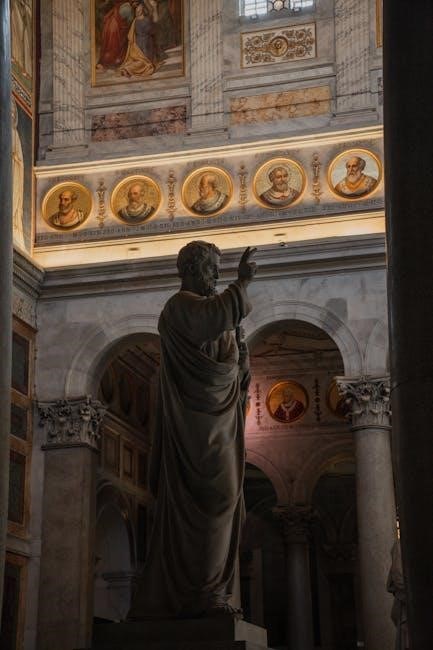
Core Elements of the Catholic Profession of Faith
2.1 The Nicene Creed
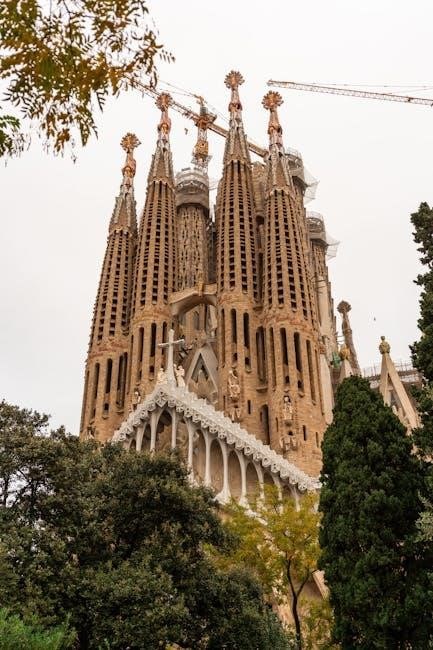
2.2 The Apostles’ Creed
2.3 The Three Persons of the Holy Trinity
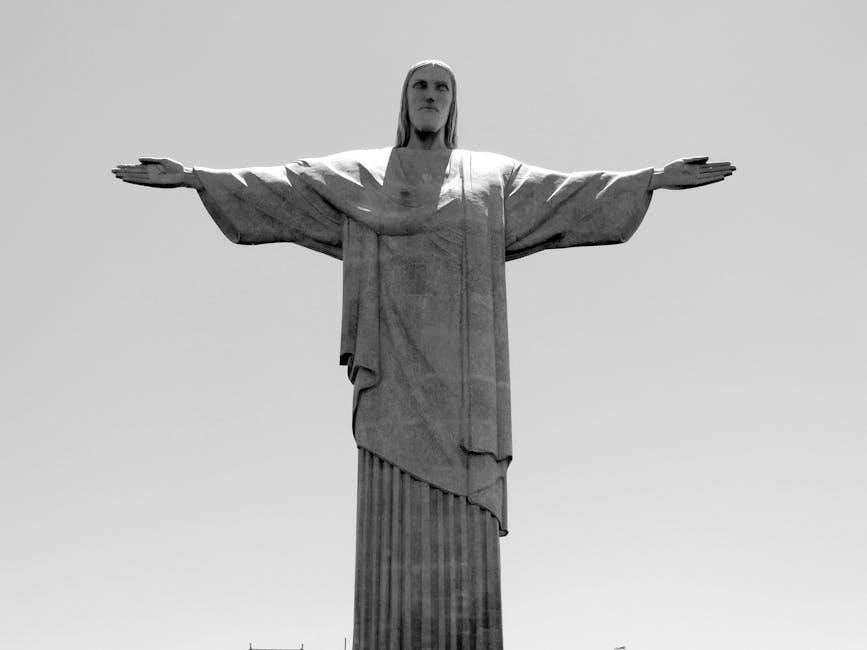
The Ritual of Profession of Faith
3.1 The Role of the Minister
3.2 The Participation of the Congregation
3.3 The Procession and Invocation

The Role of Clergy and Laity
4.1 The Responsibility of Catholic Teachers

4.2 The Role of the Pastor in Guiding the Faithful
4.3 The Commitment of the Laity
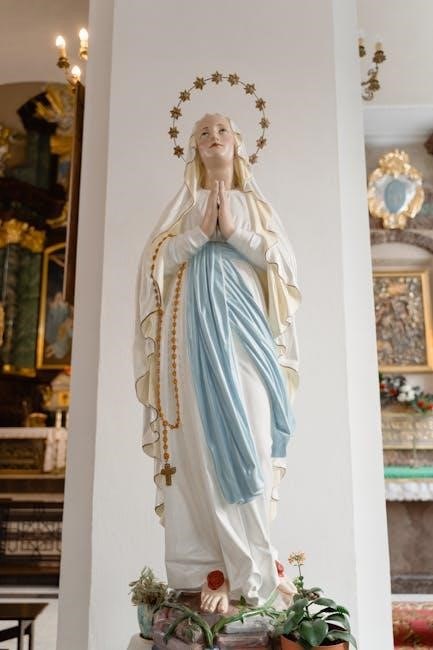
Theological Foundations
5.1 The Nature of God and the Divinity of Jesus Christ
5.2 The Holy Spirit and the Life of the Church
5.3 The Communion of Saints and the Forgiveness of Sins
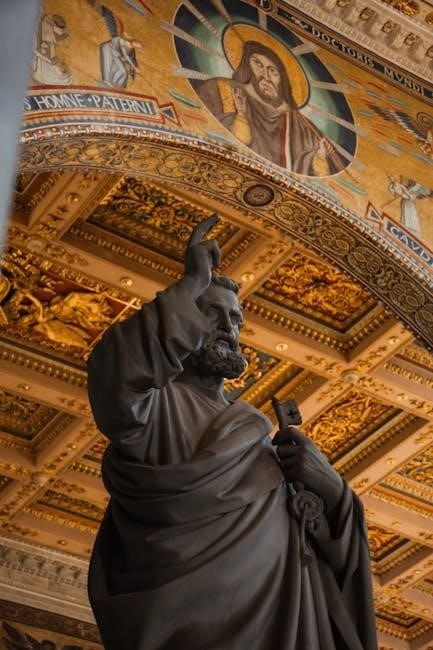
Historical Development of the Profession of Faith
6.1 The Council of Nicaea and the Nicene Creed
6.2 The Council of Trent and the Profession of Faith
6.3 Modern Interpretations and Relevance

The Profession of Faith in Daily Life
7.1 Living Out the Teachings of the Church
7.2 The Role of Prayer and Devotion
7.3 Witnessing the Faith in the World
8.1 The Enduring Importance of the Profession of Faith
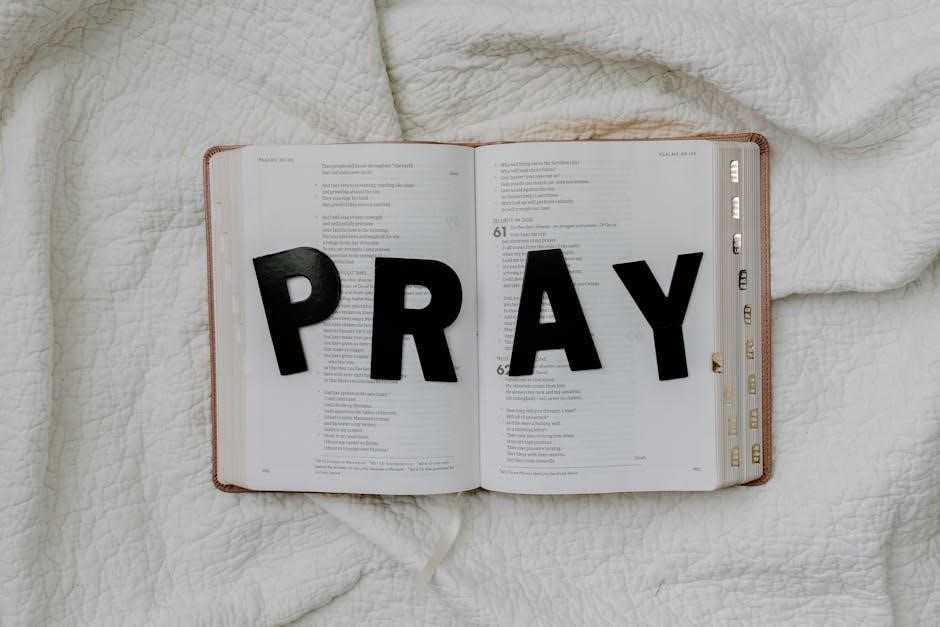
8.2 The Call to Continuous Conversion
8.3 The Universal Church and the Unity of Believers